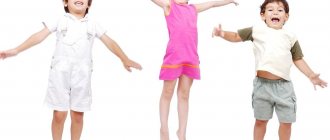A serious problem in society is child abuse. It is not a product of the 20th century, like, for example, computer addiction and child abuse go back centuries. But they started talking about it as a problem only in the twentieth century. Before this, physical punishment was seen as an effective educational technique, and psychological violence as a form of violence was not thought at all. Now the situation has changed.
Currently, there are four main forms of child abuse: psychological, physical, sexual and neglect of the needs of the child. Let's talk about each of them.
Types of emotional abuse of children
Ignoring is the most cruel and dangerous attitude of adults towards little ones - not noticing, not talking. Children suffer especially sensitively from such punishment, because they, like air, need the warmth and tenderness of their parents’ hands, hugs and kisses, without this the personality does not develop.
Rejection - mom or dad openly demonstrate and do not hide from the child that he is unwanted, unnecessary, a burden and an unnecessary financial waste.
Isolation - in case of any mistake, put in a corner for several hours, locked in a room, not allowed to go out for a walk in the yard, not talk on the phone with friends, and so on, in fact, this is any restriction on freedom.
Intimidation and threats - “if you don’t learn your homework on time, if you don’t clean your room, you won’t watch TV, if you don’t go to visit, I’ll take away your mobile phone.” This refers to permanent psychological stress and pressure on the fragile consciousness of a growing person.
Humiliation - ridicule in public, in the presence of friends, insult with unworthy words. This also includes endless lectures and lectures about “unworthy” behavior, mockery, shouting and swearing. Often, offensive phrases and words hurt more than a slap on the top of the head.
I would really like to quote Pythagoras: “Do not make children shed tears too often, otherwise they will have nothing to shed over your grave.”
Any parent wants to see their “treasure” ideal - smart, beautiful, neat, healthy, kind. As soon as it is noticed that he is “not like that”, domestic violence begins. What is most surprising is that each of them wishes only the best for their beloved child, without even suspecting how their child is tormented and suffering. I believe that most adults have absolutely no idea about the trauma inflicted on the psyche and development of a person.
Forms of psychological violence
This list contains cases that are harmful to a child. If one of the following is repeated regularly, this is psychological abuse. Therefore, if you recognize yourself in some examples, think about whether you are doing everything right in raising your child.
Intimidation, threats, blackmail.
When parents threaten to take away or throw away a favorite toy if the child does not do what the parents tell them, or when they threaten physical harm for one or another offense - this all applies here. For example, “If you throw something like that out again, I’ll put it on peas,” “Just try, I won’t leave a living place on you.” For many, this also includes the harmless “If you don’t listen, I’ll give it to the policeman/someone else’s uncle/the grandma will take it away” and even “Eat up this porridge, otherwise she’ll run after you!” A child feels safe only in the family, and with such threats he will not feel protected at all. Parents often say that they are still kind, telling how they were punished at one time, manipulating the child, making them feel even deeper guilt.
Coldness, aloofness, ignoring.
Parents push the child away when he wants to hug or kiss them. In response to “I love you” they are silent or say something like “Yes, of course, you need something from me” or “If I loved you, I would behave normally”, “Yes, yes, I want you too.” Do you need something? No? Then don’t bother me, I have work to do” and stuff like that. Ignoring may also consist in the fact that parents do not ask how the child is doing, what happened to him that day, where he went, what he is worried about. They refuse requests for help, citing the fact that the child “is already big, you have to be independent, you can’t do anything without adults!”, or they make an excuse by talking about how busy they are. Here, too, there is an indifferent attitude of parents towards the child’s misbehavior: drinking alcohol, drugs, beating peers, younger children, cruelty to animals, immoral behavior, cruelty. With the help of this behavior, the child wants to be paid at least some attention to him, but in the end it is not possible to do this even in this way. This also includes everyone’s favorite “Yes, do what you want” and going into silence until the child asks for forgiveness in tears and waits for the parent to speak in order to get relief.
Presentation of age-inappropriate demands and
comparison with other children.
Some adults believe that since they have imagined a certain model of behavior for themselves, then children should correspond to it. Or if the neighbors’ child, in the opinion of the same adults, is the best, then their child should correspond to the model in the neighborhood. As a rule, in such situations, parents forget about the desires of the child and the fact that all people are different, with their own characteristics and inclinations. That is why parents begin to demand high achievements in the natural sciences from a child who is a humanist. Or they demand that someone who picks up a rag for the first time will have perfectly clean floors with shine in every corner and every crevice. With every failure, they cite as an example another child who, in the parent’s understanding, is a hundred times better and was born with all his skills and has never been capricious or made mistakes. And, in order to fully achieve the ideal, they begin to take the child to different clubs and sections, of which there are many at once, without asking the child’s opinion. If the offspring has not achieved great success in something he does not like, he is actively bombarded with phrases like: “But Petenka is already winning the Olympics,” “But Mashenka comes home on time, and her room is clean. And she always helps her parents, not like you, you lazybones.”
Lies, duplicity, broken promises.
Parents lie to the child, manipulating his desires and thoughts. For example, they make up tall tales about what angels they were when they were children, or that they heard neighbors discussing him somewhere, or that they said something about him on the news yesterday about how bad he acted. This also includes parental behavior, which varies depending on the situation. For example, at home they are tyrants, but in public they are the most loving parents in the world. Or, when a child dances to their tune, they are good, but as soon as he tries to express his opinion or make a mistake, they break into screams and punishments. Another common situation is when a child is offered the right to choose, and when he chooses something that is not what his parents expected from him, they begin to convince the child that this choice is wrong, and that if the child makes it completely, no one will love him. Also, a caring adult can promise a child something that he has long wanted in exchange for the required behavior or service (cleaning the house, for example). And then they don’t do what they promised, due to various circumstances, they put the promises on the back burner, feed the child “breakfast”, and as soon as he mentions the unfulfilled promise, they break into a scream or pretend that they didn’t promise anything like that at all. The child himself then begins to lie, not fulfill agreements and not trust his parents.
Isolation of the child.
This includes a ban on leaving the house on your own, going for a walk, visiting friends, or leaving the room. Or parents do not limit the child’s space, but forbid him to communicate with peers or with anyone other than himself. Such measures on the part of adults are motivated by the fact that they want to protect the child from bad company. Let's remember Stephen King's book "Carrie", where the mother did not let her daughter go anywhere except school. The girl had no friends at all, and she had no one to talk to about her problems, she was teased at school, and there was no one to protect her from this either.
Insults, ridicule, humiliation .
This is the most common form of psychological violence. They call the child names, tell him that he is a burden, a curse, that no one needs him except his relatives, and even they tolerate him only because of their kind hearts. Sometimes an adult makes a careless joke, and if the child does not appreciate the humorous genius of the parent and is offended, then the answer is “How gentle we are!” doesn't keep you waiting long. Perhaps the parent is otherwise good. However, with this phrase he makes it clear to his child that his feelings are unimportant and the fact that he may be offended is of no interest to anyone. Especially often (for educational purposes, of course) parents begin to publicly insult their offspring, remind him of all his mistakes and flaws and tell him how bad and ungrateful he is.
Overprotection.
The most terrible and most unobvious type of psychological violence. Yes, you can overlove a child and ruin his life. When mommy knows better what is good for the child and decides for him; when he does not give free rein to action and discovery, because the world is so dangerous and can cause harm; when she herself chooses the child’s circle of friends, what he should be interested in, what profession to choose, she overprotects him, turning him into a puppet to realize her subconscious desires and create a better version of herself. As a rule, you cannot explain to such parents that the road to the gloomy future of a child with a bunch of problems, complexes and diseases is paved with good intentions.
Why do parents do this?
There are several reasons, here are some of them:
— lack of knowledge, own negative experience;
- economic problems in the family;
— bad relationships between spouses, discord, misunderstanding (I write more about this in the article Violence in family relationships between spouses);
- social immaturity, irresponsibility;
- any chemical dependence - alcohol, drugs.
Emotional abuse is difficult to recognize, because there are no obvious visible signs in the form of bruises, abrasions and wounds on the body, so such pressure and pressure on children is considered the most insidious type of abuse, which interferes with the personal growth and healthy formation of children.
The psychotraumatic influence of violence against a child in the family leads to inhibition of intellectual development and adequate perception of the surrounding reality. He grows up to be easily vulnerable or, conversely, extremely aggressive. In any case, the capacity for self-esteem and self-confidence is underestimated. A person develops socially helpless, easily gets into conflict situations and is rejected by peers.
Neglecting the child's needs
Neglect of a child’s needs is extremely rarely recognized by parents as psychological violence, but it is also violence.
Neglect of the child's needs is often found in dysfunctional families. We all understand that situations where children do not receive adequate nutrition, when they do not have clothing and necessary personal belongings, and do not receive medical care at the right time are not the norm. However, neglect of the child’s needs also occurs in those families that seem to be quite prosperous.
Accelerated development or a toy that is not appropriate for age. The mother of a one-year-old child buys him toys not according to his age, but for children 2-3 years older, motivating the purchases by the fact that she wants the child to develop. However, it turns out that the child does not have the opportunity to develop according to his age; at the moment he needs very simple toys: a ball, pyramids, rattles, the simplest sorter. Mom buys her son puzzles and various educational aids... Such a mother may seem very caring at first glance. However, an adult’s passion for advanced development is simultaneously a neglect of the child’s actual needs.
Parents of schoolchildren often neglect their children's desire to play, believing that they are already old enough to stop playing with toys. Therefore, a schoolchild who dreamed of receiving Lego for his birthday receives a globe (microscope, telescope, tracksuit or skis). Of course, such a gift in itself is a wonderful thing. But often a younger schoolchild still needs toys... And neglecting this need (not seeing it) is violence.
A particularly cruel form of such violence is restrictions that prevent the child from meeting important needs. For example, if a kindergarten teacher does not allow a child to go to the toilet during quiet time, then the teacher is neglecting the child’s physiological needs (the same applies to the inability to leave the classroom during a lesson). The consequence may be, for example, the development of neurosis in the child.
The mother may unknowingly neglect the needs of the child because she did not want him to be born. So, she may not call a doctor, believing that the case is not worth it, or she may simply forget to give the child medicine on time. It happens that mothers introduce complementary foods to their child too late (for example, after a year).
In my opinion, this type of violence is most difficult for adults (whether parents or teachers) to recognize as violence. That is why it is very important - both for teachers and parents - to think about their behavior, about what consequences the actions of an adult can lead to.
Signs of Emotional Child Abuse
- self-isolation, thoughtfulness, reluctance to share impressions and thoughts, aggressiveness;
- uncertainty in one’s actions;
- lack of communication, inability to communicate with peers;
- distrust of others, including loved ones;
- inability to show feelings for other people, indifference, lack of empathy;
- unjustified capriciousness in order to attract attention to oneself;
- sleep and appetite disturbances;
- far-fetched fears;
- frequent illnesses.
As soon as parents notice these symptoms, they should urgently “clean up” the educational process and draw appropriate conclusions.
Manifestations
The trauma of violence manifests itself in quite specific ways. Most often, people experience the same symptoms, which indicate that they are experiencing enormous stress. In other words, the manifestations speak for themselves; they cannot be ignored for a long time. Basically, each individual case has its own set of symptoms, but sometimes they are observed all at once.
Sleep disorders
The trauma of violence often haunts us, even in our sleep. The personality concentrates on what worries him, and this makes it impossible to fall asleep. Sometimes a person lies for a long time with his eyes open and does not know how to alleviate his emotional state. I am haunted by a feeling of emptiness, indifference to everything that is happening, and constant anxiety about the future. Sleep disturbances are a negative consequence of prolonged emotional stress.
Increasing anxiety
The feeling of fear is one of the most striking and pronounced symptoms. A person who has experienced trauma constantly experiences anxiety, frustration, and grief. It seems to him that there is a trick to be expected from everything, that nothing is done for nothing. He is overcome by deep sadness, sometimes there may be complete disappointment in life due to the fact that there are no prospects and previous hopes have been lost. It becomes incredibly difficult to explain to yourself why everything happens this way and not otherwise. In most cases, anxiety develops gradually and increases day by day.
Expecting the worst
The fear of making decisions comes from an unconscious desire to control everything. Fear of action inevitably arises when experiencing the trauma of violence. It seems that nothing good is ahead and it will never get easier. If in the past a person was haunted by continuous failures, then in the future, most likely, there will be a desire to be wary of everything that happens. Expecting the worst is a painful feeling that cannot be controlled.
What should parents do?
“The best way to make children good is to make them happy” Oscar Wilde. Wonderful, smart, healthy and developed children in every sense of the word grow up only in love. A child should be loved not because he is neat, calm, beautiful, flexible, and so on, but because he is! Of course, there is no education without punishment, but you need to correctly and competently guide your blood through life. Warn about dangers, talk about all the topics that concern him, and not refer to being busy. Share your own impressions and opinions, suggest what to do in a given situation. Allow him to make his own mistakes, otherwise his character will not develop, do not shut his mouth and, especially, do not yell or put pressure on him with authority. This does not mean being on an equal footing and indulging in every whim. This means recognizing the dignity and importance of a little person, respecting him and accepting him for who he is, slightly and unobtrusively correcting some shortcomings that are likely to hinder him in later life.
Evil comes from childhood
Psychologist and family psychotherapist Natalya Naumova, in a conversation with 360, recalled that most problems associated with violence - physical or psychological - have roots in childhood.
“Everything is connected with childhood. If a child was subjected to violence in childhood, then, as a rule, he has a need to humiliate or subject someone to violence in adulthood. But the reasons always seem objective: others are behaving incorrectly, inappropriately and as if they are insulting this person,” she said.
Childhood trauma, according to Naumova, can be associated with ignoring the child’s opinion, suppression and humiliation. Growing up, a person forgets everything. But the subconscious mind remembers what happened and strives to “close the gestalt” - to create the integrity of the picture, a feeling of revenge and freedom.
“The adult brain doesn’t remember this, so it doesn’t fully understand the goals. And [to the person] it just seems like there’s a lot of annoying stuff around. And those qualities that other people have, a person cannot accept in himself and exaggeratedly attributes them to others. This unbalances the person, the person gets into an emotional state and inflicts beatings or exerts moral pressure,” the psychologist explained.
There are two patterns according to which the situation develops. As a rule, this extends to the family - the person begins to bully loved ones. Another option is strangers
Natalya Naumova
psychologist, family psychotherapist.
A complete psychological study will help to cope with the problem, if the case is not related to pathology.
“Sometimes there are pathological processes, for example, a mental disorder. In this case, you need a psychiatrist. He will prescribe medications, and the person will be able to control himself. In any case, psychological help will be required,” the specialist emphasized.
If a person is generally healthy, then it is enough for him to sort out what is happening with a psychotherapist and psychologist, without medication.
“You will have to fully understand the problem, the pain, what causes emotions. And that’s it – there will be no need for aggression. Because the gestalt is closed,” Naumova explained.
Consequences of violence experienced
- Destroyed self-worth, self-esteem.
Violence always leads to a feeling of humiliation. And if a person, after experiencing violence, also faces accusations and shame from society, then this experience of humiliation intensifies. This ultimately often leads to the destruction of that person's self-esteem.
- Difficulty setting personal boundaries.
As a result of the violence experienced, a person begins to get confused about how he can and cannot be treated, what he wants and what he doesn’t want, what he is responsible for and what other people are responsible for. As a result, it is difficult for him to defend and defend his borders. Or, having a poor sense of his boundaries or being afraid of repeating the experience of invasion, a person sets too strict boundaries between himself and other people.
- Too aggressive behavior (when identifying with the aggressor) or prohibition of aggression (when identifying with the victim).
- Tendency to intense, toxic shame and toxic, unreasonable feelings of guilt.
- Lack of a sense of basic security, basic trust in the world and in other people. The belief that the world is dangerous and hostile leads to either the emergence of a strong fear of people, which prevents one from developing and building relationships. Or the inability to feel fear at all. Because of this, a person loses the ability to recognize threats and people who are dangerous to themselves. This attitude also leads to increased feelings of loneliness. Which people who have experienced violence already have quite a lot of because of victim blaming from society. Due to the fact that there are few opportunities to discuss with others what happened to them without running into further accusations.
- Loneliness, avoidance of close relationships, or relationships being built according to a violent scenario.
Violence experienced in childhood. How to overcome the consequences?
The main task when working through the trauma of violence experienced in childhood, if this trauma occurred in relationships with parents or other significant people, is to gain experience in non-violent relationships. That is, relationships where your personal boundaries are respected and “do not break” them.
In ordinary life, this is quite difficult to do, because... Our psyche is designed in such a way that we relive our unprocessed psychological traumas again and again. In addition, if you grew up in a violent family, then you most likely do not know how to build relationships in such a way that there is no violence in them.
You have a much greater chance of success if you work on yourself in personal therapy with a psychologist. If you do all this work together with a psychologist. Then you will have the opportunity in this therapeutic relationship to gain the experience of a non-violent relationship where your boundaries are treated with sufficient respect and care.
And this accumulated experience will help you in the future to notice and recognize people who are also respectful of your personal boundaries.
Victimblaming. Or who is to blame for the violence?
The perpetrator is always to blame for committing violence. But for some reason, too often we come across the idea that the victim of violence is to blame for what happened to her. This phenomenon is called “victim blaming.”
Usually people themselves are very afraid of finding themselves in the position of a victim of violence. And when they are faced with the fact that violence has been committed against someone, they are consciously or unconsciously very afraid that this could happen to them too. And their psyche resorts to defense - they convince themselves that the violence happened because the victim did something wrong, and that’s why this happened to her. And if she had behaved “correctly,” then the violence would not have happened.
This idea protects these people from the anxiety that similar violence could happen to them. After all, they will do everything “right,” unlike the victim of violence, and then nothing like this will happen to them.
But this defense makes them unempathetic, insensitive to the experiences of a person who has suffered from violence. They fail to provide him with support and instead add to his trauma.
After all, in order to sympathize and support a person who has experienced violence, you need to be able to put yourself in his place. We need to either internally turn to our own experience when we experienced violence, or we need to imagine what it would be like for us, how we would feel if we were in this person’s place. And for people prone to victim blaming, this is very scary. And therefore their psyche resorts to protection.
Also, when faced with the fact that someone has experienced or is still experiencing violence, and that we cannot influence it, cannot change it, we feel powerless. And when someone’s psyche for some reason cannot cope with this experience, then it can defend itself from it with the help of aggression. And then blaming the victim for the violence that occurred allows such a person to throw off this aggression, which actually hides the experience of powerlessness.










